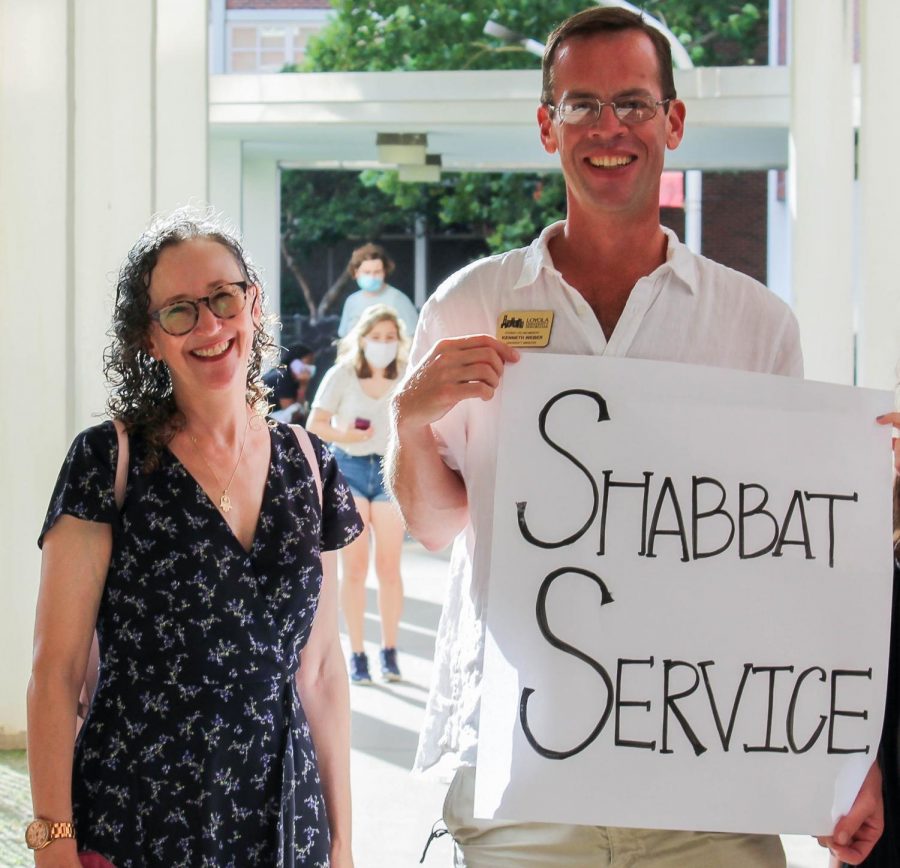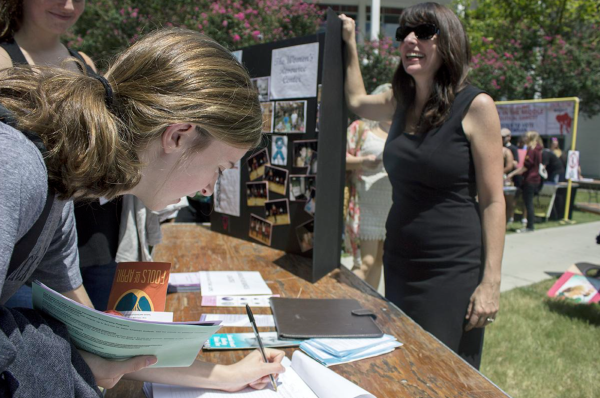Criticize Israel, but listen to your Jewish peers
Professor Naomi Yavneh and Kenneth Webber, associate director of ministry, meet and walk new students to the Tulane Hillel on August 20, 2021. Yavneh regularly serves as a greeter at her temple, Touro.
In October of 2018, I was invited to lead a workshop on “interfaith understanding” for students at the National Society for Minorities in Honors. Standing in two concentric circles, students bravely shared their experiences with bias, prejudice and hatred on their campuses. These were not just tales of micro-aggressions and assumptions made; above all, these were stories of fear: the fear of seeing a noose on campus. Of having frat boys aim their car at you, only to swerve at the last minute.
I listened. I empathized. I was an ally. But I was not afraid.
In the airport the next day, I learned of the mass shooting at the Tree of Life Synagogue in Pittsburgh. A gunman had opened fire during Saturday morning services, slaughtering 11 worshippers, including two intellectually disabled members of the congregation, who were serving as greeters that day.
I am frequently a greeter at my synagogue, Touro, here in Uptown New Orleans. I was now afraid.
In the almost three years since that shooting, my synagogue has received funding to increase our security. We have built a fence and installed improved lighting. I, along with other board members, have received training (from a former member of the Israel Defense Force) in how, as a greeter, to recognize and respond to a potential threat. (Hint: watch out for men in long coats on hot summer days.)
In those three years, anti-Jewish incidents and attacks, according to the ADL, have greatly increased. As a professor whose teaching and research frequently centers on the role of faith in intersectional identity, and the lessons of the Holocaust for today, I am struck by how infrequently the topic of antisemitism (anti-Jewish prejudice and hate) is included in conversations regarding racism and hate, even at a university with a social justice mission, like Loyola. And, as anti-Jewish attacks increased in the wake of the violent clashes between Israelis and Palestineans this past May (Jewish diners assaulted at a sushi restaurant in Los Angeles, cries like “Rape their daughters!” hurled at Jews in London, attacks on men wearing yarmulkes in multiple cities, including New York’s Times Square), I listened, stunned, to the radio silence from the academic community to this form of racially-motivated violence.
My grandmother was born, in what is now Israel, some time around 1905. Her emigration papers from 1919, granted by the Turkish government just after World War I, declare her from Palestine. When, on a visit back to Israel in 1977, my uncle took her on a sidetrip to see the Pyramids in Egypt, we discovered that she was fluent in Arabic (or “Arabian,” as she put it). In her village, she grew up with Arabs, and, although the communities largely kept to themselves, they were united in their dislike of the occupying Turks.
The Israeli-Palestinean conflict, and the actions of the Israeli government toward Palestineans, are deeply painful to me, and a topic for another day. How we come up with a solution that respects the rights of Israelis and Palestinians, Jews, Muslims, Druze and Christians in this tiny sliver of land, is one of the great questions of our time.
Spoiler alert: I am not going to solve that problem today.
Rather, I’d like us to think about the rhetoric we use when we have that conversation.
Criticism of Israel is not, by definition, anti-Jewish, but all too often it crosses the line. Natan Sharansky, a former minister in the Israeli government, developed what he terms “The Three D’s Test” to help distinguish legitimate criticism from antisemitism.
Demonization: When Israel is presented as uniquely and solely responsible for the tensions in the Middle East; Israel’s actions are conflated with those of the Nazis and Nazi Germany, or are presented as confirmation of Hitler’s hateful ideology (c.f. #Hitlerwasright);
Double-standards: When Israel is singled out for human rights abuses that are ignored when perpetrated by other countries (for example, when Israel is condemned by the United Nations, but not China, Iran, Syria, or Cuba);
Delegitimization: When Israel’s fundamental right to exist is denied.
The “Three D’s” offer a starting point for constructive reflection that can guide us, at a minimum, in developing a stronger knowledge base for discussing this challenging topic. And, indeed,
one of the great goals of college should be the opportunity for difficult conversations. As a professor for over thirty years, what I have come to see as essential is not whether you study Business or Latin American Studies or Music Industry, but how you learn to have constructive conversations across differences, to listen respectfully to others with divergent opinions (rather than tapping your feet, impatiently waiting for them to finish so you can hold forth), to effect a workable compromise or at least agree to disagree as you grab some loaded fries at Dat Dog.
My grandmother, as I said, was born in Israel. And, as a Jewish-identified person born of Jewish parents and grandparents, I could, if I so chose, claim the Israeli citizenship that is, according to their constitution, my “birthright.” (Again, a conversation for another day.)
But I am not an Israeli citizen, I am a U.S. citizen. And American Jews, like pretty much all ethnic groups in this country, are not a monolith, voting in lockstep, and based on one, overarching concern. Nor, for that matter, are Israeli Jews, who have a broad range of sentiments on the Israel-Palestine conflict.
Let me ask you: because you are American, would you want to be held personally accountable for every decision of the Trump administration? Or the Biden? Aren’t such assumptions very close to the racial profiling and systemic bias that have, finally, become a critical part of the national conversation this past year?
Criticize Israel’s policies. Better yet, go learn more about the Middle East by taking one of Professor Moazami’s wonderful classes. (He and I don’t always disagree, but we always get along.) But think about the 3 D’s, and about how we might move toward constructive conversation, instead of demonizing (and demoralizing) disagreement.







